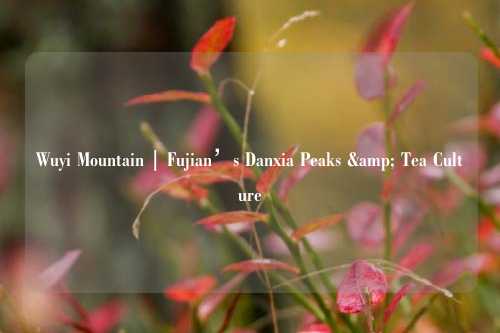Wuyi Mountain | Fujian’s Danxia Peaks & Tea Culture
Nestled in the heart of Fujian Province, Wuyi Mountain stands as a sentinel of natural beauty and richness. Renowned for its Danxia landforms, which are among the most iconic geological wonders in China, Wuyi Mountain draws visitors from around the world with its dramatic cliffs, winding trails, and lush greenery. The mountain is not only a visual feast but also a living museum of China’s tea heritage, making it a must-visit destination for both nature enthusiasts and culture seekers.
The Danxia landforms of Wuyi Mountain are a geological marvel, characterized by their layered red sandstone cliffs and pillar-like rock formations. These formations were shaped over millions of years by the forces of nature, resulting in a landscape that seems almost otherworldly. The most famous of these is the Guanghua岽 peak, which rises majestically above the surrounding hills and offers panoramic views of the valley below. Visitors can hike up to the peak, where they’ll be rewarded with stunning vistas of the Danxia地貌 and the winding Nine Bend Stream that snakes its way through the mountains.

For those looking to explore the side of Wuyi Mountain, the journey is no less rewarding. The mountain is closely tied to the history of tea in China, particularly the production of Fujian’s signature black tea, known as Wuyishan tea. The slopes of Wuyi Mountain are dotted with tea plantations, where the mountain air and mineral-rich soil contribute to the flavor and aroma of the tea. The tea culture of Wuyi Mountain is deeply rooted in tradition, with locals continuing to use age-old techniques to process and brew their tea.
One of the most popular tea varieties from Wuyi Mountain is Da Hong Pao, a premium black tea that’s renowned for its complex flavor profile and aromatic qualities. The tea’s name, which translates to “Big Red Robe,” is said to have originated from an incident in the Ming Dynasty when the tea was presented to the emperor and wrapped in a red robe to protect it during transport. Today, Da Hong Pao is a symbol of Wuyi Mountain’s tea heritage and is sought after by tea connoisseurs worldwide.
In addition to its tea plantations, Wuyi Mountain is also home to the famous Nine Bend Stream. This narrow stream, flanked by steep cliffs and verdant trees, is a highlight for many visitors. The stream’s name refers to the nine sharp bends it takes as it winds its way through the mountain, creating a series of picturesque pools and waterfalls along its route. The stream is not only a scenic beauty but also a part of the local ecosystem, providing water to the surrounding tea gardens and supporting the diverse flora and fauna of the region.
Hiking through Wuyi Mountain’s trails offers a chance to immerse oneself in both the natural and landscapes. The mountain’s paths are lined with markers that tell the story of its history, from ancient tea trade routes to the homes of famous tea masters. One such site is the Ciyun Pavilion, a tea house that dates back to the Song Dynasty. The pavilion offers visitors a chance to pause and enjoy a cup of tea while taking in the serene surroundings, a perfect way to reflect on the beauty and heritage of Wuyi Mountain.
As you explore Wuyi Mountain, it’s hard not to feel a deep sense of connection to the land. The interplay between the rugged Danxia peaks and the lush, fertile valleys below creates a landscape that feels both untamed and ly crafted. Every step along the path reveals a new perspective, whether it’s the towering cliffs of the Danxia landforms or the delicate tea buds that signal the arrival of spring.
Wuyi Mountain’s tea culture is more than just a tradition; it’s a way of life that has been preserved and passed down through generations. The mountain’s tea plantations are a testament to the dedication and craftsmanship of the local tea growers, who take pride in maintaining the methods of tea cultivation and processing. These methods are deeply intertwined with the natural environment, as the tea plants thrive in the microclimate created by the mountain’s elevation and surrounding forests.
The tea production process in Wuyi Mountain is a art that requires skill and patience. The leaves are harvested at specific times of the year, carefully handpicked to ensure only the est and most vibrant leaves are used. The processing involves several steps, including withering, rolling, and oxidation, each of which plays a crucial role in developing the tea’s flavor and aroma. The result is a tea that is not only rich and complex but also carries the essence of the mountain itself.
In addition to Da Hong Pao, Wuyi Mountain is also known for other premium teas like Shui Xian and Rougui. Shui Xian, which means “water仙,” is a fragrant and floral tea that’s often compared to the aroma of orchids. Rougui, on the other hand, is a spicy and robust tea that is beloved for its bold character and lingering aftertaste. Each of these teas has its own profile, reflecting the diverse conditions of the mountain and the skill of the tea makers.
The tea ceremony, a way of brewing and serving tea in China, is a popular activity in Wuyi Mountain. The ceremony emphasizes respect, harmony, and mindfulness, with each step of the process performed with intention. Visitors can learn about the nuances of the tea ceremony and even participate in workshops where they can practice the art themselves. The experience offers a chance to slow down and appreciate the simple yet act of drinking tea, a practice that has been central to Chinese culture for centuries.
Beyond the tea plantations, Wuyi Mountain’s landscape is home to a wealth of natural and attractions. The mountain’s trails lead to hidden waterfalls, serene temples, and breathtaking viewpoints that offer a glimpse into the spiritual and historical significance of the region. One such site is the Tianxin Pavilion, a historic temple that sits atop a high cliff and offers a panoramic view of the Danxia landforms. The pavilion is a place of worship and reflection, attracting pilgrims and tourists alike who come to connect with the spiritual energy of the mountain.
The heritage of Wuyi Mountain is also evident in its architecture and way of life. Many of the village houses are built in the Fujian style, with tiled roofs and wooden beams that blend ly with the natural surroundings. The villages are quiet and idyllic, with narrow cobblestone streets and lush gardens that provide a peaceful contrast to the bustling outside world.
For those looking to experience the charm of Wuyi Mountain, staying in a tea house or homestay is a wonderful way to immerse oneself in the local culture. Many of these accommodations offer guests the opportunity to participate in tea tastings, watch tea demonstrations, and learn about the history of the mountain. The warmth and hospitality of the local people, combined with the serene beauty of the surroundings, make Wuyi Mountain a truly unforgettable destination.
, Wuyi Mountain is more than just a destination; it’s an experience that engages the senses and enriches the soul. Whether you’re marveling at the Danxia peaks, savoring the aroma of a ly brewed cup of tea, or strolling through the serene valleys, every moment spent in Wuyi Mountain is a chance to connect with nature and culture in a way that’s truly . So, pack your bags, lace up your hiking boots, and embark on a journey to Wuyi Mountain—a place where the beauty of the land and the richness of tradition come together in perfect harmony.
















